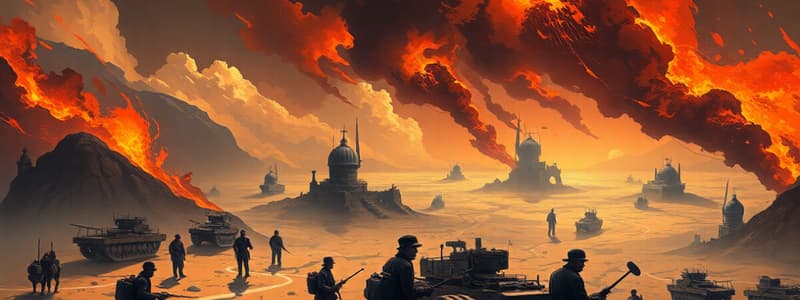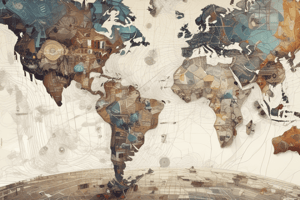Podcast
Questions and Answers
What economic impact did the war have on agricultural production in certain countries?
What economic impact did the war have on agricultural production in certain countries?
- It promoted reliance on European imports for agricultural goods.
- It caused a complete halt in agricultural activities.
- It led to a decrease in production across all countries.
- It stimulated production in both established and virgin territories. (correct)
Which statement best explains the geopolitical changes that occurred post-WWI?
Which statement best explains the geopolitical changes that occurred post-WWI?
- The United States and Japan did not benefit from the war's disruption.
- Germany re-established dominance in international trade immediately after the war.
- European nations regained all the markets they had previously lost.
- Latin American and Asian countries developed their own manufacturing industries. (correct)
How did submarine warfare specifically affect international relations during WWI?
How did submarine warfare specifically affect international relations during WWI?
- It led to increased cooperation between neutral countries.
- It had no significant impact on the outcome of the war.
- It prompted the United States to intervene in the conflict. (correct)
- It improved trade relations between Germany and Britain.
What was a significant consequence of the direct controls imposed during the war?
What was a significant consequence of the direct controls imposed during the war?
What was a long-term impact of the war on maritime transport?
What was a long-term impact of the war on maritime transport?
Which country had to divest a portion of its investments to finance the war, according to the information provided?
Which country had to divest a portion of its investments to finance the war, according to the information provided?
What was a significant loss due to World War I that affected the labor supply?
What was a significant loss due to World War I that affected the labor supply?
What was one of the consequences of the war combined with the Spanish flu epidemic?
What was one of the consequences of the war combined with the Spanish flu epidemic?
What was the response to the growing demand for civil goods after World War I?
What was the response to the growing demand for civil goods after World War I?
Which country had investments that were confiscated and later used as reparations?
Which country had investments that were confiscated and later used as reparations?
What was a notable demographic change resulting from World War I?
What was a notable demographic change resulting from World War I?
Which of the following statements best describes the impact of the Spanish flu epidemic during the war?
Which of the following statements best describes the impact of the Spanish flu epidemic during the war?
What factor contributed to the fear of inflation in post-war economies?
What factor contributed to the fear of inflation in post-war economies?
Which factor is NOT listed as a macro category contributing to the outbreak of WWI?
Which factor is NOT listed as a macro category contributing to the outbreak of WWI?
What was one significant economic consequence of WWI?
What was one significant economic consequence of WWI?
Which of the following was a geopolitical change brought about by WWI?
Which of the following was a geopolitical change brought about by WWI?
What was a cultural effect of WWI as per the historical context provided?
What was a cultural effect of WWI as per the historical context provided?
Which industry saw a significant reallocation of resources during WWI?
Which industry saw a significant reallocation of resources during WWI?
What was a primary resource reallocated for military use during WWI?
What was a primary resource reallocated for military use during WWI?
What consequence did WWI have on the pillars of globalisation?
What consequence did WWI have on the pillars of globalisation?
Fritz Fischer highlighted Germany's desire for what regarding Eastern Europe?
Fritz Fischer highlighted Germany's desire for what regarding Eastern Europe?
Flashcards
Economic Warfare (WWI)
Economic Warfare (WWI)
Disrupted trade, especially between Germany and Britain, often involving submarine warfare.
WWI Economic Controls
WWI Economic Controls
Governments during WWI directly controlled prices, production, and labor distribution.
Loss of Foreign Markets (WWI)
Loss of Foreign Markets (WWI)
European blockades caused other countries to produce goods themselves or buy from non-European nations.
Agricultural Wartime Production
Agricultural Wartime Production
Signup and view all the flashcards
Maritime Transport Change
Maritime Transport Change
Signup and view all the flashcards
WWI Origins
WWI Origins
Signup and view all the flashcards
Macro Factors of WWI
Macro Factors of WWI
Signup and view all the flashcards
Economic WWI Impact
Economic WWI Impact
Signup and view all the flashcards
Globalisation Breakdown
Globalisation Breakdown
Signup and view all the flashcards
Resource Reallocation
Resource Reallocation
Signup and view all the flashcards
Industrial Industries
Industrial Industries
Signup and view all the flashcards
Political Consequences
Political Consequences
Signup and view all the flashcards
War's Technological Impact
War's Technological Impact
Signup and view all the flashcards
WWI Economic Impact
WWI Economic Impact
Signup and view all the flashcards
Investment Divestment
Investment Divestment
Signup and view all the flashcards
German Investment Confiscation
German Investment Confiscation
Signup and view all the flashcards
WWI Casualties
WWI Casualties
Signup and view all the flashcards
Labour Supply Impact
Labour Supply Impact
Signup and view all the flashcards
Industrial Reconversion
Industrial Reconversion
Signup and view all the flashcards
Inflation concern
Inflation concern
Signup and view all the flashcards
War Exports
War Exports
Signup and view all the flashcards
Study Notes
The Great War (WWI)
- WWI, also known as the First World War, was a significant historical event with continuing relevance today
- The war had profound political and economic ramifications
- Major characteristics of the war included: socio-economic changes occuring over long time periods, changes in demography, resources, technology, abrupt political changes, and the destruction of international economic relations.
Disintegration of the International Economy
- Major socio-economic changes typically occur gradually over long periods of time, influenced by demography, resource availability, and technological advancements.
- Political shifts can be sudden, leading to unexpected economic changes.
- World War I destroyed the complex international economic and trade system that had evolved during the 19th century, ending the "first globalization".
WWI: A Still Relevant Debate?
- WWI was the first global war, employing soldiers from various nationalities and employing modern economic and technological warfare
- The war marked the beginning of state planning in the economic realm.
- Geopolitical changes resulted in the end of old empires (Austria-Hungary, Ottoman) and the emergence of new non-European powers (US, Japan)
- The war signaled the start of the communist experiment
- The war spurred nationalism and had a significant cultural impact.
Origins of World War I
- From a diplomatic standpoint, the assassination of Archduke Franz Ferdinand by a Serbian student triggered the war
- Austria-Hungary declared war on Serbia, triggering a cascade of alliances involving Russia and other European powers.
- The conflict was a complex result of a process that began in the mid-19th century, focused on imperial expansion and the partitioning of lands by European Powers.
- The Balkans were a region of intensifying conflict due to competing desires for dominance by European powers and rising nationalism in new states (Serbia, Romania, Bulgaria).
- This conflict was driven by a combination of factors including: breakdown of alliances, new nationalistic demands, new geopolitical demands, economic competition, differing cultures and ideologies and advancements in technology and science
WWI: Consequences of the Conflict
- WWI brought about profound economic and political changes
- The war involved extensive economic mobilization, strong government intervention, and significant economic losses.
- The war ended the initial phase of globalization, impacting trade, foreign investment, the gold standard, migration, and financial markets.
- The war involved a significant reallocation of resources from civilian goods to military production
- Labor force, capital, and raw materials were primarily focused on wartime demands, leading to substantial growth in the metallurgical, shipbuilding, chemical, mechanical, and armaments industries.
WWI: Consequences of Peace
- The American intervention in the war significantly altered the outcome
- The Treaty of Versailles in 1919 formally ended the war, imposing punitive measures and debts on Germany
- Key consequences of the treaty included: growth of economic nationalism; and monetary and financial instability.
Studying That Suits You
Use AI to generate personalized quizzes and flashcards to suit your learning preferences.




